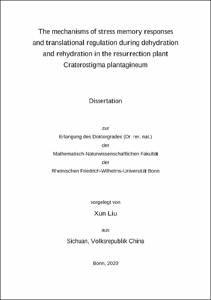Liu, Xun: The mechanisms of stress memory responses and translational regulation during dehydration and rehydration in the resurrection plant Craterostigma plantagineum. - Bonn, 2020. - Dissertation, Rheinische Friedrich-Wilhelms-Universität Bonn.
Online-Ausgabe in bonndoc: https://nbn-resolving.org/urn:nbn:de:hbz:5-58589
Online-Ausgabe in bonndoc: https://nbn-resolving.org/urn:nbn:de:hbz:5-58589
@phdthesis{handle:20.500.11811/8380,
urn: https://nbn-resolving.org/urn:nbn:de:hbz:5-58589,
author = {{Xun Liu}},
title = {The mechanisms of stress memory responses and translational regulation during dehydration and rehydration in the resurrection plant Craterostigma plantagineum},
school = {Rheinische Friedrich-Wilhelms-Universität Bonn},
year = 2020,
month = may,
note = {Dehydration stress is one of the major environmental factors affecting the survival rate and productivity of plants. Currently, many dehydration-induced genes and some dehydration-related protective mechanisms desiccation tolerant resurrection plant Craterostigma plantagineum have been reported. However, the mechanisms involved in desiccation tolerance and the regulation of the fast recovery process are not fully understood.
In CHAPTER 2, the dehydration stress memory has been analyzed in C. plantagineum, which had been exposed to four dehydration/rehydration treatment cycles. Expression of related genes and changes of physiological data indicate a gain of stress tolerance and also point a stress memory. Interestingly, the analysis of four representative stress-related proteins showed that the activated stress memory can persist over several days. This phenomenon is most likely a general feature of the dehydration stress memory response in resurrection plants.
In CHAPTER 3, the total mRNA and polysomal mRNA profiles were investigated through RNA sequencing to identify genes related to desiccation tolerance and to the fast recovery process during four different stages in dehydration and rehydration in C. plantagineum. The results indicated different regulation of translation in the two phases: from partial dehydration to desiccation, and from desiccation to rehydration. Several transcription factor families (such as zinc finger, WRKY, and ARF) are involved in translational regulation during dehydration and rehydration.
In CHAPTER 4, we focused on the identification and characterization of CTP:phosphocholine cytidylyltransferase CpCCT1 in C. plantagineum. The results showed that CpCCT1 is a dehydration-induced gene and is under translational control from partial dehydration to desiccation. CpCCT1 has the conserved catalytic domain and membrane-binding domain while the N-terminal and C-terminal domains are divergent. CpCCT1 can respond to dehydration stress, salt stress, cold stress, mannitol, sorbitol, ABA and IAA treatments on the transcriptional level in the leaf and root tissues of C. plantagineum.},
url = {https://hdl.handle.net/20.500.11811/8380}
}
urn: https://nbn-resolving.org/urn:nbn:de:hbz:5-58589,
author = {{Xun Liu}},
title = {The mechanisms of stress memory responses and translational regulation during dehydration and rehydration in the resurrection plant Craterostigma plantagineum},
school = {Rheinische Friedrich-Wilhelms-Universität Bonn},
year = 2020,
month = may,
note = {Dehydration stress is one of the major environmental factors affecting the survival rate and productivity of plants. Currently, many dehydration-induced genes and some dehydration-related protective mechanisms desiccation tolerant resurrection plant Craterostigma plantagineum have been reported. However, the mechanisms involved in desiccation tolerance and the regulation of the fast recovery process are not fully understood.
In CHAPTER 2, the dehydration stress memory has been analyzed in C. plantagineum, which had been exposed to four dehydration/rehydration treatment cycles. Expression of related genes and changes of physiological data indicate a gain of stress tolerance and also point a stress memory. Interestingly, the analysis of four representative stress-related proteins showed that the activated stress memory can persist over several days. This phenomenon is most likely a general feature of the dehydration stress memory response in resurrection plants.
In CHAPTER 3, the total mRNA and polysomal mRNA profiles were investigated through RNA sequencing to identify genes related to desiccation tolerance and to the fast recovery process during four different stages in dehydration and rehydration in C. plantagineum. The results indicated different regulation of translation in the two phases: from partial dehydration to desiccation, and from desiccation to rehydration. Several transcription factor families (such as zinc finger, WRKY, and ARF) are involved in translational regulation during dehydration and rehydration.
In CHAPTER 4, we focused on the identification and characterization of CTP:phosphocholine cytidylyltransferase CpCCT1 in C. plantagineum. The results showed that CpCCT1 is a dehydration-induced gene and is under translational control from partial dehydration to desiccation. CpCCT1 has the conserved catalytic domain and membrane-binding domain while the N-terminal and C-terminal domains are divergent. CpCCT1 can respond to dehydration stress, salt stress, cold stress, mannitol, sorbitol, ABA and IAA treatments on the transcriptional level in the leaf and root tissues of C. plantagineum.},
url = {https://hdl.handle.net/20.500.11811/8380}
}






